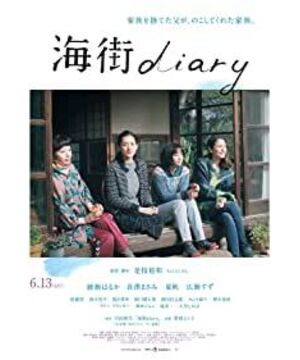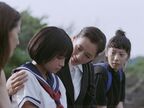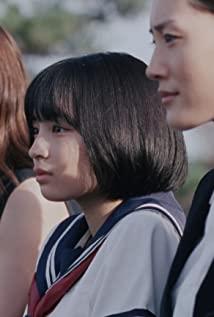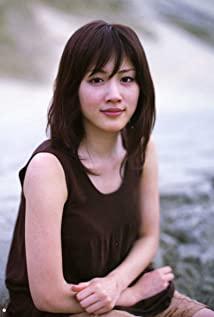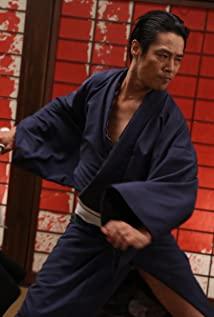2015-05-19 Published in the DeepFocus public account
Text/kyd, Zhang Yuxuan, PeterCat, Liu Ying (from Cannes)
Hirokazu Eede is undoubtedly one of the most well-known Japanese directors in China at the moment. This kind of reputation is largely due to the fact that his films are a return to the ethical order of warm East Asian families. The concern for family life allows his works to evoke the audience's memories of Ozu Yasujiro's Japanese family images.
In the new film "Diary of the Sea Street", which was shortlisted for the main competition at Cannes this year, it tells the story of the four sisters living together after the death of his father. This is still his best style. It is indifferent and timeless and satisfies all our imaginations about Japan.
B=The Bund Pictorial
H= is Hirokazu Koreeda (Hirokazu Koreeda)
B: The story of "Diary of the Sea Street" comes from a female manga of the same name by the manga artist Yoshida Akimi. As far as I know, her work has been adapted into film and television works more than once, including "The Wonders of the World" and so on. Have you seen these works? What do you think of the characteristics of Yoshida Akiu's manga that have attracted so many Japanese directors to adapt and shoot?
H: Akio Yoshida is my personal favorite cartoonist, and I have been a loyal reader of her for the past two decades. When I read "Haijie Diary" for the first time, the idea of "I want to make this story into a movie" came into my mind immediately. I didn't want others to take it in front of me. I firmly believed that the person who adapted it must It will be me.
B: "Diary of the Sea Street" is considered a girl manga. Is it common for men of your age to read girl manga in Japan? Is it strange?
H: I will watch it. Indeed, she is a cartoonist who focuses on women, but apart from some typical BL works aimed at girls, in fact, she also has a lot of comics that are loved by readers of different genders and all ages. Men in their 30s and 40s. It will also be her loyal reader. I'm in my 50s, but I still like her work very much.
B: This movie is still about the family themes you are good at, and the style is also light and timeless, but there are also many people who comment that the story is too sweet. What kind of experience do you want the audience to get from this movie?
H: Of course, I would like the audience to discover and appreciate the meticulous performances of several female protagonists. They are very careful when interpreting the characters. "Haijie Diary" is not just a story about the protagonist, but also a movie about time. I hope the audience can understand the meaning of this level when watching it.
"Ayase Haruka's elegance is rare in Japan."
B: Among the four heroines, you emphatically portray the eldest sister Xing Xing of the three sisters, and the half sister Ling. Why is there such a focus?
H: First of all, it is consistent with the original work. Secondly, compared with other sisters, Sister Xing understands her father better. She said at the beginning, "Even if he was kind and kind, he was only a bad father in the end." Later, she gradually changed her words, "Although he is not a good father, he may be a good man. "It can be seen that she is learning to change and gradually treats her father with a positive attitude.
In the same way, the change happened to Xiaomeiling. She was always burdened with a sense of guilt at first—"Why am I born?", "Why should I come into this world?"—She felt that her own existence gave her Other families brought unhappiness. Gradually, she started to face herself and began to accept and understand her existence. It is this similarity that allows me to focus more on the two of them.
B: This time you chose four "oxygen beauties" as the heroines. Haruka Ayase and Masami Nagasawa are already well-known stars. Ayase Haruka has acted in many TV comedies before, which feels very cute and naughty, while Nagasawa Masami takes the sweet and intellectual route more. This seems to be the reverse of the role arrangement in "Haijie Diary".
H: Indeed, Ayase Haruka has acted in a lot of comedy-style film and television works, but in reality, when I met her, I knew she was the best candidate for Sister Xing. She is very beautiful, dignified, and extremely elegant-in contemporary Japanese society, such elegance is no longer seen. And this dignified beauty is very consistent with the image of elder sister Xing.
B: While this movie brings me warmth, it also makes me hungry. Can you tell me what role those food-related scenes play in the movie?
H: On the one hand, because the whole plot revolves around the death of his father, if the whole film focuses on this, it will become a too sad story. It is not a good story I want, so I think Add as many food-related scenes as possible to dilute it.
On the other hand, the food in the movie is all related to the memories of the four sisters. Plum wine, Kamakura's special small whitebait, and the unique food of the seaside town are all closely related to the memories. In a movie like this depicting a family, the core of the story is that as time goes by, some things happen and pass, but some things will remain in people’s hearts and be passed on from generation to generation. One of the important carriers is food. This is why this type of scene is particularly important in the movie.
B: Does the seaside restaurant in Kamakura that appeared in the movie exist in reality? Can you tell me your impression of this place in Kamakura? What do you like best about this seaside town?
H: It's a pity that there is no such shop in reality. In fact, Kamakura is a well-known tourist attraction. There are many temples there, such as Meigetsuin Temple, which is famous for its hydrangea. I try to avoid showing this side of Kamakura in the movie, because then it will be close to the perspective of a tourist, rather than the daily life that "Diary of the Sea Street" wants to present.
In the movie, from the home of the four sisters to the station, the hydrangea blooms all the way, very beautiful. I just want to show the beauty of Kamakura in such an ordinary life scene.
"I never ask actors to see Ozu Yasujiro's movies"
B: Ozu Yasujiro's tomb is in Kita-Kamakura. Have you ever visited it?
H: The place where we filmed is actually very close to it, but I didn't go this time, but I went to it several times when I was still in college.
B: You have always been regarded as a Japanese director who inherited Ozu's mantle. When talking about your films, there will always be comparisons with Ozu's films. What do you think of this?
H: It's not just this movie. Every time I come to Western countries, especially Europe, someone always mentions Ozu Yasujiro's works. I think those who say this should be complimenting me, but to be honest, I am a bit at a loss and even feel the pressure that comes with it.
This time, "Diary of the Sea Street", I admit that it does have similarities with his work-this is a movie about people, about looking beyond the frame of time to examine the trajectory of life. Of course, when shooting, I never ask actors to watch Ozu Yasujiro's movies or draw inspiration from them, and I personally did think about his work before shooting.
B: In your previous works (such as "Father Like Son"), my father made a rash decision and regretted not making the original decision. In this "Diary of the Sea Street", the sisters were hesitant about some decisions. In your opinion, is this the difference between the protagonists of the two works?
H: This difference between men and women, as for the indiscretion and hesitation in making decisions, I haven't considered it much. In the story, the eldest sister fortunately gave Xiaomei Ling an old bathrobe and asked her to wear it to the fireworks display. Fortunately, she firmly wants to provoke the burden of taking care of her younger sisters, including this newly-emerged half-sister. Fortunately, she is not even planning to marry someone, but has to stay at home forever. I can't say that this is a happy ending, but she is very firm, so I also respect her attitude.
B: No one knows the past of the role of "father" in the movie. Do you have plans to make another story like this?
H: I lost my father and mother in the past ten years and became the father of my child. I think maybe it's because of this kind of role change, so I pay more attention to the stories of other family members.
The original text was first published in "The Bund Pictorial"
View more about Our Little Sister reviews


